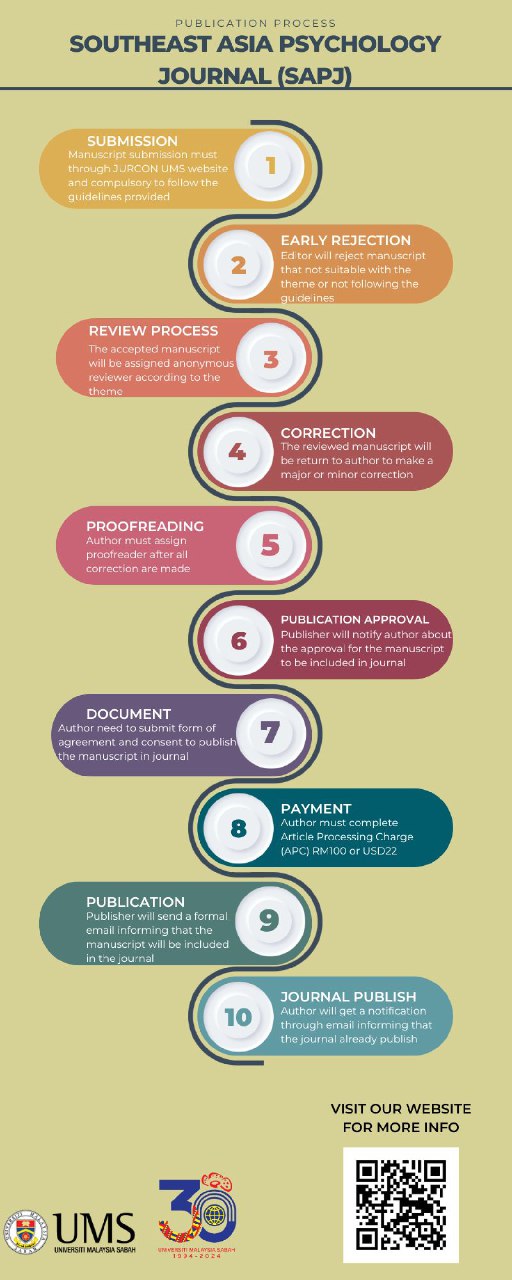THE LEVEL OF HAPPINESS AMONG COUNSELLING STUDENTS IN MALAYSIA
DOI:
https://doi.org/10.51200/sapj.v10i2.4938Keywords:
Level of Happiness, Counselling Students, Gender, MalaysiaAbstract
This study examined the level of happiness among counselling students in seven public universities in Malaysia (N = 299). On therage, the counselling students' happiness score was 3.49 (SD = 0.502). This is a moderate score for happiness. The positive items most strongly agreed by participants were item 3 “I feel that life is very useful,” endorsed by 22.4% of the participants, followed by item 9 “Life is good” by 21.7% and em 11 “ I always laugh by 15.7% of the participants. On the other hand, the negative items strongly disagreed by participants were item 29 “I have no happy memories of the past,” endorsed by 52.5% of the participants, followed by item 24 “I have no particular meaning and purpose in my life,” endorsed by 43.5 of the participants and item 10 “I don't think that the world is a good place” endorsed by 42.5% of the participants. This showed that even though the level of happiness was only moderate, students still thought that life was good and meaningful. As for the difference of happiness between genders, the result showed that there was no significant difference of happiness between genders t(297)= 1.88, p>.05. This could be due to the equal opportunities given to all students; thus males and females shoulders the same responsibilities and burdens. The students went through the same Movement Control Orders and therefore had the same experiences in this hard time.
References
Abdel-Khalek, A. M. (2006). Happiness, health, and religiosity: Significant relations. Journal of Mental Health, Religion & Culture, 9(1), 85-97. http://dx.doi.org/10.1080/13694670500040625 Abolmaali, K, Rashedi, M., & Ajilchi B. (2014). Explanation of Academic Achievement Based on Personality Characteristics Psycho-Social Climate of the Classroom and Students’ Academic Engagement in Mathematics Open Journal of Applied Sciences, 4 (5), 225-233.
Alam, B.F., Hussain, T., Tauqir, S., Ali, S., Najmi, A., & Javed, S. (2001). Assessing the level of happiness among dental students of Pakistan: Web-based study. Pakistan Journal of Medical & Health Sciences, 15 (7). https://doi.org/10.53350/pjmhs211571629 Bourne, P.A., Douglas, S.,S.A., Smith, A., Gayle, A-K., Fallah, J., Campbell, C., Foster, C., Mclean, C., Parkes, D.R., White, M.E., & Muchee, M.E. (2022). Gender disparity in happiness among Jamaicans during the COVID-19 pandemic. Global Journal of Emerging Trend in Education and Social Science, 5(1), 20-30.https://doi.org/10.31579/IJBR-2022/081
Compton, W. C., & Hoffman, E. (2013). Positive psychology: the science of happiness and flourishing (2nd ed.). USA: Cengage Learning. Cruise, S. M., Lewis, C. A., & Guckin, C. M. (2006). Internal consistency, reliability, and temporal stability of the Oxford happiness questionnaire short-form: Test-retest data over two weeks. Social Behavior and Personality: an international journal, 34(2), 123-126.
Dieber, E.d., Emmons, R.A., Larsen, R.J., & Griffine, S. (1985). The Satisfaction With Life Scale. Journal of Personality Assessment, 71-75. https://doi.org/10.1207/s15327752jpa4901_13
Feldman, F. (2008). Whole life satisfaction concepts of happiness.[internet]. Willey online library THEORIA, 74 (3), (pp. 219-238). htttp://people.umass.edu/ffeldman/WLS_the _g Flynn, D., & MacLeod, S.P. (2015). Determinants of Happiness in Undergraduate University Students. College student journal, 49, 452-460. Fredrickson, B. L. (2009). Positivity: Groundbreaking research reveals how to embrace the hidden strength of positive emotions, overcome negativity, and thrive. Crown Archetype
Galambos, N. L., Fang, S., Krahn, H.J., Johnson M. D., & Lachman, M. E. (2015). Up, not down: The age curve in happiness from early adulthood to midlife in two longitudinal studies. Developmental Psychology, 51 (11), 1664-1671
Giannopoulos, V. L., & Vella-Brodrick, D. A. (2011). Effects of Positive Interventions and Orientations to Happiness on Subjective Well-Being. The Journal of Positive Psychology, 6, 95- 105.
https://doi.org/10.1080/17439760.2010.545428
Guan T.E., Agnis S., Assis K. & Ho,C.M. (2022). Pembelajaran atas talian dan darjah kegembiraan pelajar universti di Sabah semasa Perintah Kawalan Pergerakan. In Chua, B.S. & Getrude C.. Psikologi masyarakat Borneo era pandemic COVID-19 (pp. 50-66). Penerbit Universiti Malaysia Sabah.
Hills & Argyle (2002). The Oxford Happiness Questionnaire: A compact scale for the measurement of psychological well-being. Personality and Individual Differences, 33, 1073-1082.
Hoffman, L., Hutchinson, C., & Reiss, E. (2009). On improving school climate: Reducing reliance on rewards and punishment. International Journal of Whole Schooling, 5(1), 13-24. ERIC database. Joseph, J. & Joseph, M.I. (2013). Emotional Competency and Happiness among Teacher Trainees. Journal of Behavioral and Social Sciences, 1 (2), 85-90. Julis, S., Pitil, P. P., & Wahed, W. J. E. (2021). Are you healthy and happy? A Cross-Sectional Study on Mental Health and Happiness among University Student-Athletes in Malaysia. International Journal of Academic Research in Business and Social Sciences, 11(3), 1321-1331.
Kaya, Şerife & Ileri, Yusuf & Yuceler, Aydan. (2016). Happiness perception of students: An application in the faculty of health sciences in Konya. The Malaysian Journal of Public Health Medicine (MJPHM). 16, 40-44.
Khodarahimi, S. (2013). Hope and flourishing in an Iranian adults sample: Their contributions to the positive and negative emotions. Applied Research in Quality of Life, 8(3), 361-372.
Krejcie, R.V., Morgan, D.W. (1970). Determining sample size for research activities, Educational and Psychological Measurement, 30 (3), 607-610. Kulkarni, S., & Chincholikar, S. (2019). Happiness level among medical students of a medical college. International Journal of Community Medicine and Public Health, 6 (7), 3024-3028.
Levitt, Dana & Jacques, Jodi. (2005). Promoting Tolerance for Ambiguity in Counselor Training Programs. Journal of Humanistic Counseling, Education and Development, 44 (1), 46-54 Lyubomirsky, S. (2001). Why are some people happier than others? The role of cognitive and motivational processes in well-being. American Psychologist, 56(3), 239–249. https://doi.org/10.1037/0003-066X.56.3.239
Lyubomirsky S. & King, L. (2005). The benefits of frequent positive affect: Does happiness lead to success? Psychological Bulletin, American Psychological Association, 131 (6) ,803– 855.
Martínez‐marín, M.D & Martínez, C. (2019) Subjective well‐being and gender‐typed attributes in adolescents: The relevance of emotional intelligence, Australian Journal of Psychology, 71 (3), 296-304. DOI: 10.1111/ajpy.12247 To link to this article: https://doi.org/10.111 Michalak, J., Teismann, T., Heidenreich, T., Ströhle, G., & Vocks, S. (2011). Buffering low self-esteem: The effect of mindful acceptance on the relationship between self-esteem and depression. Personality and Individual Differences, 50(5), 751–754. https://doi.org/10.1016/j.paid.2010.11.029 Morgan, J., Robinson, O., & Thompson, T. (2015). Happiness and age in European adults: The moderating role of gross domestic product per capita. Psychology and aging, 30(3), 544.
Natvig, G. K., Albrektsen, G., & Qvarnstrom, U. (2003). Associations between psychosocial factors and happiness among school adolescents. International Journal of Nursing Practice, 9, 166-175. https://doi:10.1046/j.1440-172X.2003.00419.x Stevenson, B., & Wolfers, J. (2009). The paradox of declining female happiness. American Economic Journal: Economic Policy, 1(2), 190-225.
Tkach, C., & Lyubomirsky, S. (2006). How do people pursue happiness? Relating personality, happiness-increasing strategies, and well-being. Journal of Happiness Studies. 6(2),43-56. Toker, B., & Kalıpçı, M. B. (2022). Happiness among tourism students: a study on the effect of demographic variables on happiness. Anatolia, 33(3), 299-309. Wollwage, S.D (2008). Resilience: An examination of well-being and optimism of youth. Loyola University Chicago ProQuest Dissertations Publishing.
https://www.proquest.com/openview/ae0953ef9e962df0264276929d2d3d3e/1?pq-origsite=gscholar&cbl=18750
Wren-Lewis, S. (2010). Towards a Complete Account of Psychological Happiness. Praxis, 2(2), 58-81. Yusof, Suzana & Sham, F & Shohor, Norhafizatul & Jamalluddin, A & Ambli, N & Zulkifli, N. (2021). Happiness Index Among Nursing Students in Universiti Teknologi MARA. Journal of Islamic, Social, Economics and Development (JISED), 6(36), 138-145.








